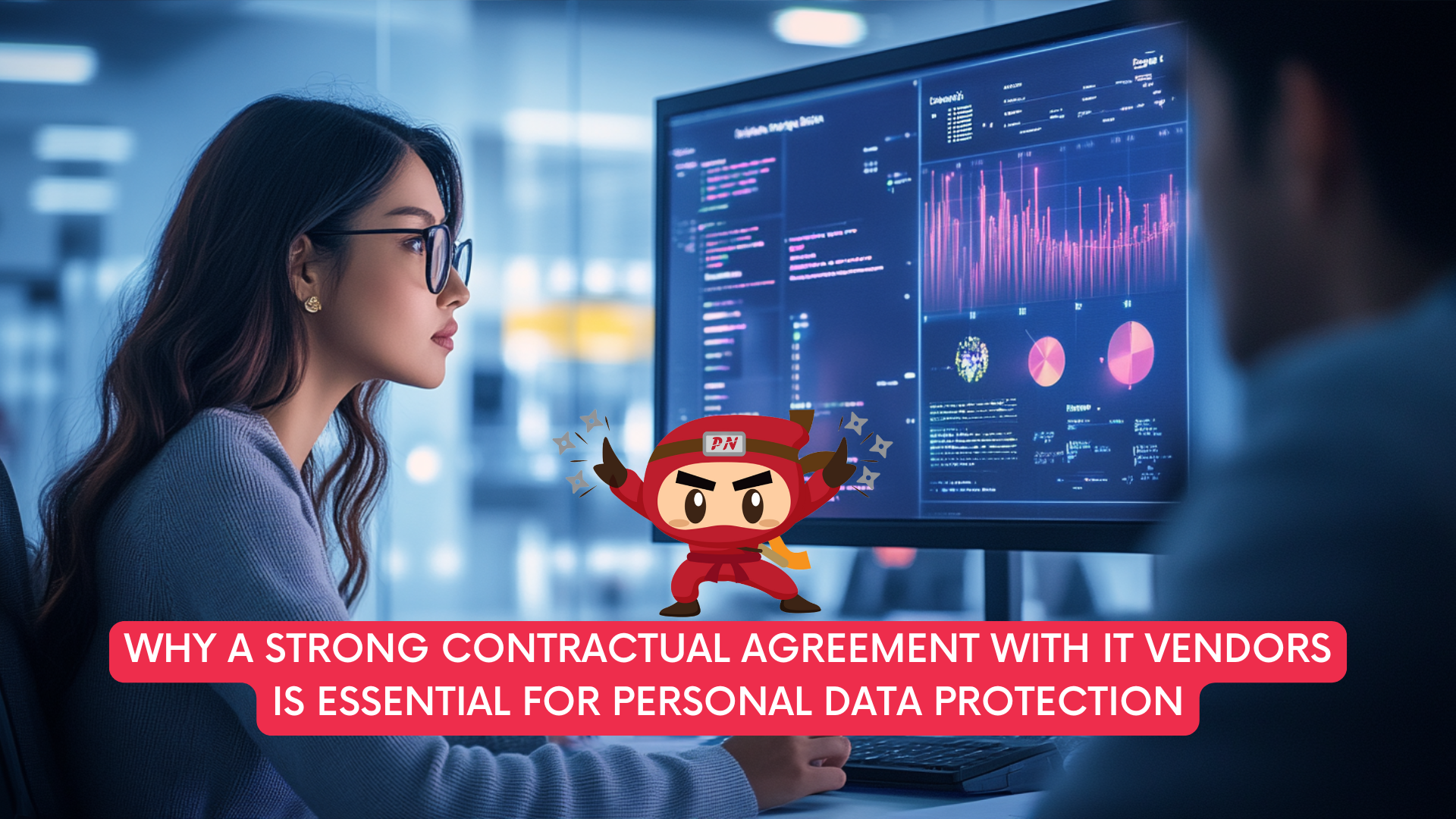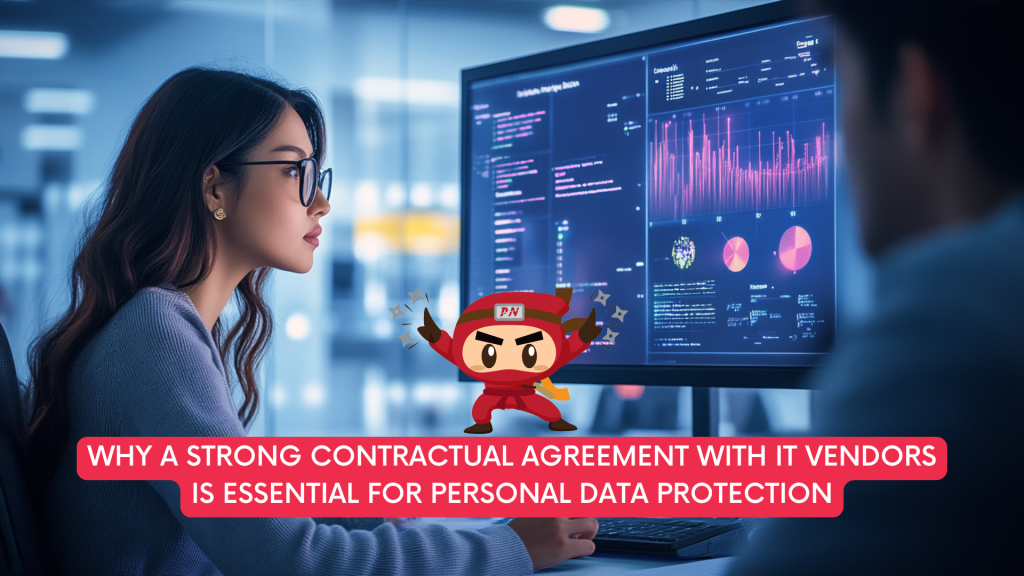KEEP IN TOUCH
Subscribe to our mailing list to get free tips on Data Protection and Cybersecurity updates weekly!







In today’s interconnected business landscape, many organizations rely on IT vendors to provide services and support for their technological infrastructure. However, with the increasing reliance on third-party vendors comes a heightened risk concerning the security of sensitive information. When engaging vendors for IT services, especially those handling personal data, it is essential to establish a robust contractual agreement that clearly defines the obligations of the IT vendor regarding data protection. A well-structured contract serves as both a protective measure for your organization and a safeguard for the personal data you are responsible for maintaining.
Outsourcing IT services to third-party vendors has become a standard practice for many businesses. These vendors may manage anything from cloud storage and data hosting to software development and cybersecurity. While these services are crucial for business growth and operational efficiency, they also expose organizations to increased risks, particularly regarding the protection of personal data.
Personal data, especially sensitive customer information, is a valuable asset, and its mishandling can have serious legal and financial consequences. In the event of a data breach or improper handling of personal data, both your organization and your IT vendor could face reputational damage, regulatory fines, and lawsuits. Therefore, it is essential to ensure that any third-party vendor you engage for IT services understands their role in protecting this data and is contractually obligated to uphold those standards.

Depending on the type of services provided, IT vendors may handle a variety of personal data on behalf of your organization. Some common types of personal data that IT vendors may come into contact with include:
For each type of data, IT vendors must implement tailored security measures that ensure its confidentiality and integrity throughout its lifecycle. This requires the vendor to be aware of the specific security risks and responsibilities associated with the data they are processing.

A well-drafted contractual agreement with your IT vendor is more than just a formal arrangement—it is a critical tool for ensuring the protection of personal data. Here are the key reasons why this contract is essential:
The contractual agreement should outline the vendor’s responsibilities in handling personal data. This includes specifying the type of data they will have access to, how they will protect it, and the measures they will take to ensure its confidentiality, integrity, and availability. By clearly stating these obligations, both parties understand the scope of their roles and the necessary actions to take in the event of a breach.
For example, the contract should cover topics like encryption, access controls, and regular audits. It should also establish guidelines for incident response in case of a security breach, ensuring the vendor acts quickly and cooperatively to mitigate damage.
Depending on the location of your organization and the vendor, both parties may be subject to various data protection laws and regulations. These include:
A well-defined contract should require the vendor to comply with applicable laws, including data breach notification requirements, the right of data subjects to access and delete their data, and the implementation of appropriate security measures. This helps mitigate legal and financial risks by ensuring that both parties adhere to their respective obligations under the law.
The contract should specify the security standards the vendor is expected to meet. These may include:
These requirements should be tailored to the sensitivity of the personal data being handled. Without clear security standards, it becomes difficult to ensure that the vendor is meeting the necessary level of protection, leaving your organization vulnerable to data breaches.
An essential part of the contractual agreement should include detailed provisions regarding incident response and data breach notifications. In the event of a data breach or security incident, the vendor must notify your organization within a specific timeframe (usually within 72 hours under GDPR).
The agreement should also establish protocols for investigating the breach, communicating with affected parties, and providing necessary support in managing the fallout from the breach. By having these procedures in place, the organization can respond promptly and efficiently, reducing the potential damage caused by the breach.
The contract should specify how long the IT vendor is allowed to retain personal data and the procedures for securely deleting or returning the data once the vendor’s services are no longer required. This ensures that data is not kept longer than necessary and is disposed of securely, minimizing the risk of exposure.
To ensure that the IT vendor is complying with the terms of the contract and maintaining proper security controls, your organization should retain the right to audit the vendor’s operations and access logs. Regular audits can help identify any weaknesses in the vendor’s security posture and ensure they are adhering to the agreed-upon data protection measures.
When drafting the contract with your IT vendor, consider the following key points:

As businesses increasingly rely on IT vendors for essential services, the importance of a strong contractual agreement regarding data protection cannot be overstated. By clearly defining the obligations of the IT vendor, organizations can ensure that personal data is handled securely, comply with relevant data protection laws, and mitigate the risks associated with vendor relationships. A well-crafted contract serves as a safeguard for both parties, ensuring that personal data remains protected and that the vendor fulfills its role in maintaining the security of sensitive information.
Your appointed DPO can work with you on your PDPA compliance, ensuring that there will be policies in place to make sure that the handling of personal data is PDPA compliant.
A Data Protection Officer (DPO) oversees data protection responsibilities and ensures that organisations comply with the Personal Data Protection Act (PDPA). Furthermore, every Organisation’s DPO should be able to curb any instances of PDPA noncompliance as it is the officer responsible for maintaining the positive posture of an organisation’s cybersecurity.
DPOs complement organisations’ efforts to ensure that the organisation’s methods of collecting personal data comply with the PDPA. It also ensures that policies are set in place to make sure that there will be no instances of data breaches in the future.
Don’t wait any longer to ensure your organisation is PDPA compliant. Take our free 3-minute PDPA Compliance Self-audit checklist now, the same “secret weapon” used by our clients to keep them on track. Upon completion, we will send you the results so you can take the necessary action to protect your customers’ data. Complete the free assessment checklist today and take the first step towards protecting your customers’ personal data.